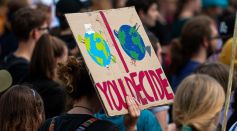ENVIRONMENT & CLIMATE
How Do Tiger Sharks Court? This Video Footage Could Explain the Process

Plastic Pollution Could Be Leading Sea Turtles into an 'Evolutionary Trap," Can They Still Avert This Disaster?

EEI: Earth's Energy Imbalance is Human-Induced and Less Than 1% Natural, Study Says

Massive Melting Event in Greenland Is So Big It Could Cover Florida; Should We Fear Ocean Level Rise?
Notable Discoveries in Science 50, 100, and 150 Years Ago That Are Not Widely Known
Tufted Titmouse: Bird Species That Scientists Call 'Fur Thief' of Live Predators
Sumatran Tigers in Indonesia Recovering From COVID-19, Cause of Coronavirus in Animals Still Unknown
Dark Sky Preserves: Protecting Pieces of Natural Night Sky Against Artificial Light
Unique Brain Structures Might've Helped Ancient Birds Outlive Nonavian Dinosaurs

NASA-DCOTSS Mission Explores How Summertime Thunderstorms Influence Climate Change Using ER-2 809 Airplane

Bottled Water Vs. Tap Water: Study Estimates Health and Environmental Impacts of Water Consumption in Barcelona
1.8 Million-Year-Old Jawbone of Eurasian Hunting Dog Found Alongside Human Remains
Oldest-Ever Animal Fossils Discovered in Canada: Proves Aquatic Sponge-Like Creatures Exist 890 Million Years Ago

14,000 Scientists Declare Climate Emergency, Continued Negligence to Climate Change May Bring "Untold Suffering"
Most Popular

Top 10 Scientific & Robotics Innovations from CES 2026: Advancing AI, Smart Tech, and Robotics

Gas Giants vs Rocky Planets: The Ultimate Planet Types Comparison

Faster Than Light Travel: How Warp Drive Physics and Relativity Challenge the Limits of Space Travel

Science vs. Global Warming: Is It Too Late for Mitigation Science and Climate Change Solutions?





